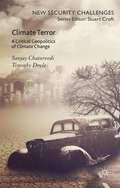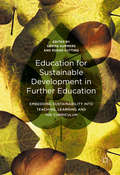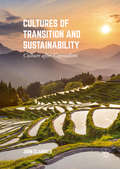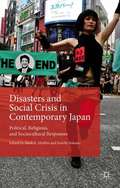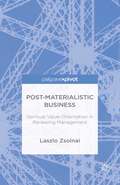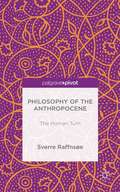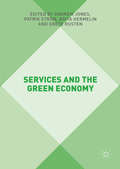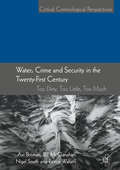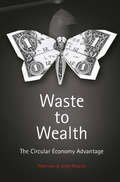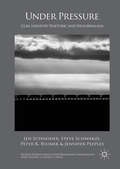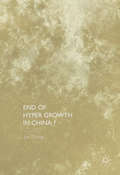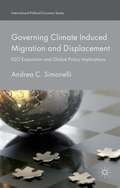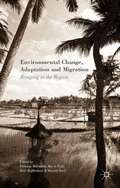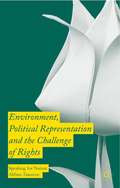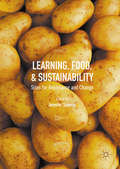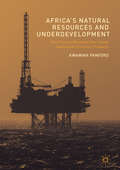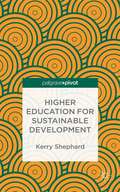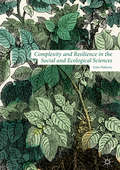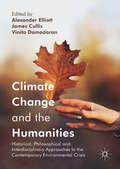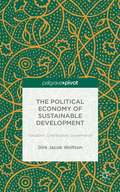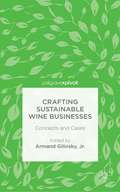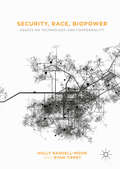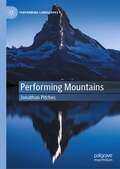- Table View
- List View
Climate Terror
by Sanjay Chaturvedi Timothy DoyleClimate Terror investigates the highly differentiated geographical politics of global warming. It explores how fear-inducing climate change discourses could result in new forms of dependencies, domination and militarized 'climate security'. In this revealing study from Chaturvedi and Doyle, the concept of environmental security is brought to life through cases of the most pressing environmental issues confronting the Global South, which are creating desperate realities for billions of people. The book proposes the following key questions, crucial to our understanding of this issue: Can the climate discourse be re-configured to provide a place where issues of environmental justice and sovereignty are paramount, rather than neo-liberal responses to climate? Can climate change give a voice to the global periphery, and can it be used as a vehicle for emancipation? Chaturvedi and Doyle's study concludes by taking note of the more optimistic response of 'emancipatory' groups and networks to concepts such as climate justice and climate debt, and the ways in which these groups have attempted to use this global climate moment for more democratic purposes. Is the climate story, regardless of its diverse intentions, a discourse now captured by the affluent North to control the development of the Global South? Has the emancipatory moment now passed or is there still hope for the re-emergence of subaltern perspectives on climate futures? The authors further discuss the deployment of terror vocabulary to address climate change, which is a part of refurbished designs and technologies of control, regulation and domination in a neo-liberal, post-political, globalized world marked by profound asymmetries in terms of economic growth and human development. They argue for an increased understanding of the environment, not as an external enemy force, but as adiverse nature that is inclusive of people, a nature that has the potential to provide secure access to citizens of all countries to basic nutrition, adequate access to health, appropriate shelter, and a security to practice a diverse range of livelihoods.
Education for Sustainable Development in Further Education
by Denise Summers Roger CuttingThisbook will enable teachers and managers in the post-compulsory sector to considera range of approaches to embed Education for Sustainable Development (ESD) intheir practice in the post-compulsory sector. There will be the opportunity to consider key debates, useful links andsuggested reading to encourage further investigation and development ofpractice. Fundamentally, this book aimsto empower teachers to critically analyse ESD through their own subjectspecialisms, engage in the debate and learn with their students. Democratic and participative approachesintroduced will help readers to question traditional transmissive styles ofteaching and learning and move on to the radical and transformative approachesrequired to embrace ESD. Therefore this book, whilst including illustrativeexamples, will encourage the reader to look at their own subject specialisms,practice, interests and those of their students to co-construct a curriculum thatembeds ESD.
Cultures of Transition and Sustainability: Culture after Capitalism
by John ClammerContending that culture lies at the root of our current planetary and civilizational crisis, this book uniquely explores the nature of the specifically cultural dimensions of that crisis and how culture relates to the areas of politics, policy, economics, ecology and the whole discourse of sustainability. It debates how profoundly our world is shaped by capitalist culture, emphasizing the import of political culture and policy, social justice, leadership and community in the shaping of a new cultural sustainability. It also reintroduces questions of religion, art, citizenship and comparative culture into the sustainability debate and suggests ways in which the central issue of consumer culture can be rethought and others in which socially satisfactory transitions to a sustainable future might be achieved. Addressing the specific role of culture in our crisis and of how to build cultural resources for transition, this cutting edge text provides the reader with an introduction to the literature on culture and sustainability, and both practical and theoretical tools for creating and advancing a humane and ecologically responsible future.
Disasters and Social Crisis in Contemporary Japan: Political, Religious, And Sociocultural Responses
by Koichi Nakano Mark MullinsJapan was shaken by the 'double disaster' of earthquake and sarin gas attack in 1995, and in 2011 it was hit once again by the 'triple disaster' of earthquake, tsunami, and nuclear meltdown. This international, multi-disciplinary group of scholars examines the state and societal responses to the disasters and social crisis.
Charles Taylor’s Ecological Conversations: Politics, Commonalities And The Natural Environment
by Glen LehmanThe author uses the work of the eminent Canadian philosopher, Charles Taylor, to develop a critique of those political perspectives that are based on instrumental ways to reason about the world, claiming that such perspectives invariably sever the connections between the social and natural worlds.
Post-Materialist Business: Spiritual Value-Orientation in Renewing Management
by László ZsolnaiPost-Materialist Business presents a spiritual-based approach to business and management. It uses pluralistic view of spirituality and provides a number of inspiring cases of alternative organizations which go beyond the materialistic mindset of business and serve the common good of society, nature, and future generations.
Services and the Green Economy
by Andrew Jones Patrik Ström Brita Hermelin Grete RustenServices and the Green Economy addresses a significant gap in theknowledge and understanding of sustainable economic development. Bringingtogether a range of expert contributions the book analyses the role of servicesand service industries in the transition to a greener economy. Framed by anapproach within environmental economic geography, chapters written by leadingresearchers from a range of disciplines explore how service industries, servicefirms and service activities are at heart of green economic processes. Adoptinga global perspective, it includes research from the US, Europe, South Americaand Japan, providing a detailed insight into how the crucial role of serviceindustry activity has often been ignored in current understandings of a greeneconomic transition.
Water, Crime and Security in the Twenty-First Century: Too Dirty, Too Little, Too Much (Critical Criminological Perspectives )
by Reece Walters Nigel South Bill McClanahan Avi BrismanWater, Crime and Security in the Twenty-First Century represents criminology’s first book-length contribution to the study of water and water-related crimes, harms and security. The chapters cover topics such as: water pollution, access to fresh water in the Global North and Global South, water and climate change, the commodification of water and privatization, water security and pacification, and activism and resistance surrounding issues of access and pollution. With examples ranging from Rio de Janeiro to Flint, Michigan to the Thames River, this original study offers a comprehensive criminological overview of the contemporary and historical relationship between water and crime. Coinciding with the International Decade for Action, “Water for Sustainable Development,” 2018–2028, this timely volume will be of particular relevance to students and scholars of green criminology, as well as those interested in critical geography, environmental anthropology, environmental sociology, political ecology, and the study of corporate crime and state crime.
Waste to Wealth: The Circular Economy Advantage
by Jakob Rutqvist Peter LacyWaste to Wealth proves that 'green' and 'growth' need not be binary alternatives. The book examines five new business models that provide circular growth from deploying sustainable resources to the sharing economy before setting out what business leaders need to do to implement the models successfully.
Under Pressure
by Jennifer Peeples Peter K. Bsumek Steve Schwarze Jen SchneiderThis book examines five rhetorical strategies used by the US coal industry to advance its interests in the face of growing economic and environmental pressures: industrial apocalyptic, corporate ventriloquism, technological shell game, hypocrite's trap, and energy utopia. The authors argue that these strategies appeal to and reinforce neoliberalism, a discourse and set of practices that privilege market rationality and individual freedom and responsibility above all else. As the coal industry has become the leading target and leverage point for those seeking more aggressive action to mitigate climate change, their corporate advocacy may foreshadow rhetorical strategies available to other fossil fuel industries as they manage similar economic and cultural shifts. The authors' analysis of coal's corporate advocacy also identifies contradictions and points of vulnerability in the organized resistance to climate action as well as the larger ideological formation of neoliberalism.
Green Marketing: A Case Study Of The Sub-industry In Turkey
by Ayca KirgizGreen Marketing examines the concept of 'Green Marketing' using examples from Turkey and the rest of the world. The book examines Sa-ba Inc. as a case study which is among the pioneering enterprises in Turket's automative sub-industy and its green marketing strategies.
End of Hyper Growth in China?
by Jun ZhangIn this book, Dr. Jun Zhang rebuts the widely-held view that Chinese economic growth is unsustainable due to low consumption and a reliance on exports and enormous fixed-asset investments. Though many believe this "structural imbalance" of the Chinese economy will become a serious problem in the long run, Zhang holds a bullish long-term outlook owing to China's long-term economic development. For Zhang, China's structural problems are greatly exaggerated and certain structures, such as regional governing entities, ensure that China will not face the same economic issues that Japan encountered. Through regional competition, regional governments will persevere; Zhang predicts that China will overtake the US as a superpower. Zhang concludes by acknowledging the real dangers facing China's economy, and offering advice on the reforms needed to ensure continued growth.
Governing Climate Induced Migration and Displacement: Igo Expansion And Global Policy Implications (International Political Economy Series)
by Andrea SimonelliAndrea Simonelli provides the first in-depth evaluation of climate displacement in the field of political science, specifically global governance. She evaluates four intergovernmental organizations (UNHCR, IOM, OCHA and the UNFCCC), and the structural and political constraints regarding their potential expansion to govern this new issue area.
Environmental Change, Adaptation and Migration: Bringing In The Region
by Felicitas HillmannThe contributors present empirical and theoretical insights on current debates on environmental change, adaptation and migration. While focusing on countries subject to environmental degradation, it calls for a regional perspective that recognises local actors and a systematic link between development studies and migration research.
Environment, Political Representation and the Challenge of Rights: Speaking For Nature
by Mihnea TanasescuTanasescu examines the rights of nature in terms of its constituent parts. Besides offering a thorough theoretical grounding, the book gives a first detailed overview of the actual cases of rights for nature so far. This is the first comprehensive treatment of the rights of nature to date, both analytically and in terms of actual cases.
Learning, Food, and Sustainability
by Jennifer SumnerThis edited volume explores the intersection of learning and food, both within and beyond the classroom, all within the context of sustainability. Taking a broad pedagogical approach to the question of food, it focuses on learning and change in a number of key sites including schools, homes, communities, and social movements, keeping in mind that we need to learn our way out of our current unsustainable food system and in to more sustainable alternatives.
Africa’s Natural Resources and Underdevelopment: How Ghana’s Petroleum Can Create Sustainable Economic Prosperity
by Kwamina PanfordThis book explores how African countries can convert their natural resources, particularly oil and gas, into sustainable development assets. Using Ghana, one of the continent's newest oil-producing countries, as a lens, it examines the "resource curse" faced by other producers - such as Nigeria, Angola, and Equatorial Guinea - and demonstrates how mismanagement in those countries can provide valuable lessons for new oil producers in Africa and elsewhere. Relying on a broad range of fieldwork and policymaking experience, Panford suggests practical measures for resource-rich developing countries to transform natural resources into valuable assets that can help create jobs, boost human resources, and improve living and working conditions in Ghana in particular. He suggests fiscal, legal, and environmental antidotes to resource mismanagement, which he identifies as the major obstacle to socioeconomic development in countries that have historically relied on natural resources.
Higher Education for Sustainable Development
by Kerry ShephardHigher Education for Sustainable Development.
Complexity and Resilience in the Social and Ecological Sciences
by Eoin FlahertyThis book introduces a new approach to environmental sociology, by integrating complexity-informed social science, Marxian ecological theory, and resilience-based human ecology. It argues that sociologists have largely ignored developments in ecology which move beyond functionalist approaches to systems analysis, and as a result, environmental sociology has failed to capitalise not only on the analytical promise of resilience ecology, but on complementary developments in complexity theory. By tracing the origins and discussing current developments in each of these areas, it offers several paths to interdisciplinary dialogue. Eoin Flaherty argues that complexity theory and Marxian ecology can enhance our understanding of the social aspect of social-ecological systems, whilst a resilience approach can sharpen the analytical power of environmental sociology.
Climate Change and the Humanities: Historical, Philosophical and Interdisciplinary Approaches to the Contemporary Environmental Crisis
by Vinita Damodaran Alexander Elliott James CullisThis volume of essays fills a lacunae in the current climate change debate by bringing new perspectives on the role of humanities scholars within this debate. The humanities have historically played an important role in the various debates on environment, climate and society. The past two decades especially have seen a resurfacing of these environmental concerns across humanities disciplines in the wake of what has been termed climate change. This book argues that these disciplines should be more confident and vocal in responding to climate change while questioning the way in which the climate change debate is currently being conducted in academic, political and social arenas. Addressing climate change through the varied approaches of the humanities means re-thinking and re-evaluating its fundamental assumptions and responses to perceived crisis through the lens of history, philosophy and literature. The volume aims thus to be a catalyst for emerging scholarship in this field and to appeal to an academic and popular readership.
The Political Economy of Sustainable Development: Valuation, Distribution, Governance
by Dirk Jacob WolfsonThe author shows how sustainable development may be organized, valued and distributed by introducing situational contracting as an interactive and contextual mode of governance. Situational contracting provides a road map for where we want to go, serving the prevailing ideology in implementing the trade between efficiency and fairness.
Crafting Sustainable Wine Businesses: Concepts and Cases
by Armand Gilinsky Jr.Sustainable wine businesses are being crafted around the world, leaving the land in better shape for the next generation. In this book, four case studies reveal that sustainability in the wine industry it is tied tightly to long-term profitability.
Security, Race, Biopower
by Ryan Tippet Holly Randell-MoonThis book explores how technologies of media, medicine, law and governance enable and constrain the mobility of bodies within geographies of space and race. Each chapter describes and critiques the ways in which contemporary technologies produce citizens according to their statistical risk or value in an atmosphere of generalised security, both in relation to categories of race, and within the new possibilities for locating and managing bodies in space. The topics covered include: drone warfare, the global distribution of HIV-prevention drugs, racial profiling in airports, Indigenous sovereignty, consumer lifestyle apps and their ecological and labour costs, and anti-aging therapies. Security, Race, Biopower makes innovative contributions to multiple disciplines and identifies emerging social and political concerns with security, race and risk that invite further scholarly attention. It will be of great interest to scholars and students in disciplinary fields including Media and Communication, Geography, Science and Technology Studies, Political Science and Sociology.
Performing Mountains (Performing Landscapes)
by Jonathan PitchesLaunching the landmark Performing Landscapes series, Performing Mountains brings together for the first time Mountain Studies and Performance Studies in order to examine an international selection of dramatic responses to mountain landscapes. Moving between different registers of writing, the book offers a critical assessment of how the cultural turn in landscape studies interacts with the practices of environmental theatre and performance. Conceived in three main parts, it begins by unpicking the layers of disciplinary complexity in both fields, before surveying the rich history and practice of rituals, playtexts and site specific works inspired by mountains. The last section moves to a unique analysis of mountains themselves using key concepts from performance: training, scenography, acting and spectatorship. Threaded throughout is a very personal tale of mountain research, offering a handrail or alternative guide through the book.
